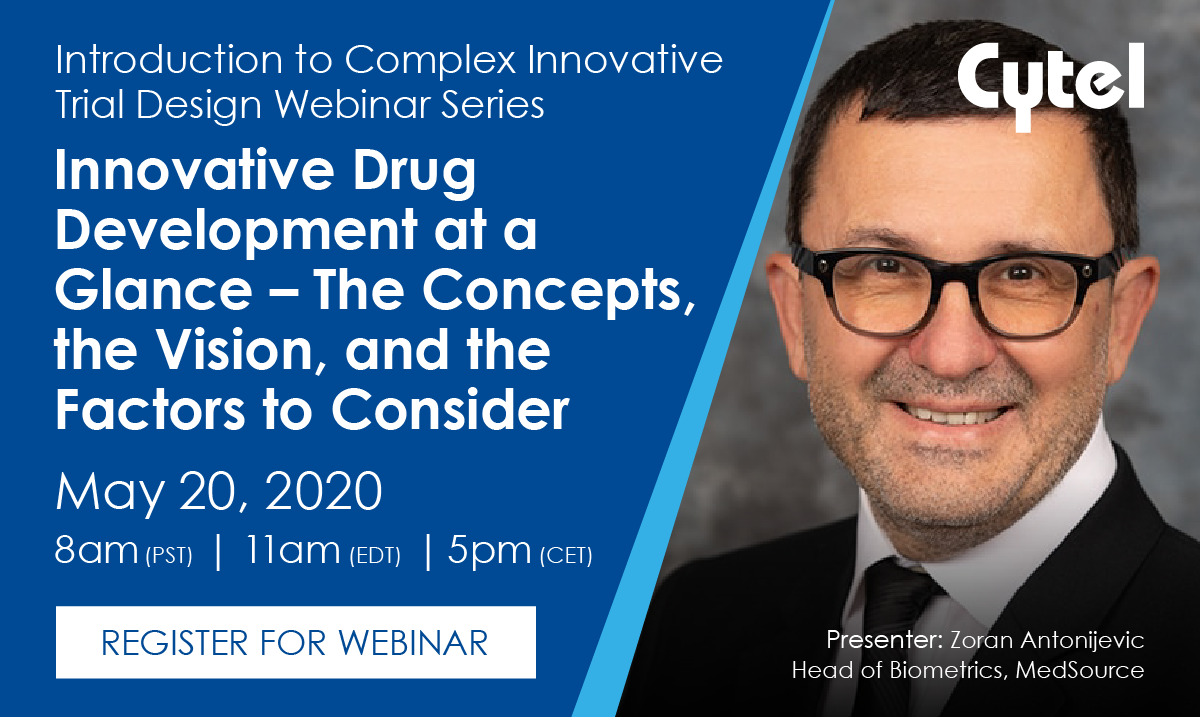Interview with Zoran Antonijevic on Adaptive Design Methods

In this blog, we speak with Zoran Antonijevic, longstanding chair and leader of the DIA Adaptive Design Scientific Working Group, and former Principal Statistical Consultant at Cytel. We speak about adaptive design methods, their value to the industry, their success and ways to overcome the existing challenges including the hesitation towards its wide adoption.
This summer Cytel is hosting a new webinar series that introduces clinical fellows, early career biostatisticians, and others interested in clinical research, to some of the more commonly used complex innovative trial designs. These webinars will cover the benefits of each design, and the practical considerations for adoption.
On May 20, 2020 Zoran Antonijevic is going to present an introductory overview of all these advanced design methods, in a webinar from this series. This webinar will define complex innovative trial design, briefly introduce the concepts, summarize the potential benefits of each, and highlight key factors to consider when applying these techniques. You can register by clicking on the button below.
Cytel: Can you give us some background about your career and how you became associated with the DIA Adaptive Design Scientific Working Group?
Zoran Antonijevic (ZA): Like many others I started my career as a project biostatistician working on routine tasks. When I got my first strategic statistical job, it coincided with the formation of the Adaptive Design Scientific Working Group (ADSWG), which was under PhRMA at that time. It was a natural step for me to join this group. I have always been very passionate about roles that involved designing trials and developing strategies. In my opinion, statisticians should evolve much more strongly into strategic roles.
When I joined the ADSWG, I was given the responsibility to lead one activity and from thereon there was no looking back. It was all very exciting and interesting for me and eventually I got elected as the Chair of the ADSWG in 2013, which was now under the DIA. I held that position for several years before I stepped down. However, I continue to be involved with the joint leadership of the DIA Adaptive Design and Bayesian Scientific Working Groups.
Cytel: What are the methods that you are advancing? Tell us a bit about their history, their ethical and commercial value.
ZA: In this upcoming webinar I will be discussing several families of innovative designs and approaches. Let us begin with the concept of adaptive designs which are very helpful in dealing with uncertainty and the variability in the data that is collected during clinical trials. For example, at the trial design stage, you are uncertain about the magnitude of treatment effect to expect. When you plan the study, your information is limited, you are not comfortable about sample size assumptions and you would want to reassess them in a scientifically sound way. Other examples are dose and subpopulation selection. Adaptive designs allow you to re-evaluate the accuracy of your assumptions and decisions as data accumulate during the trial, rather than having to make your final selections at the beginning of the trial.
Let us go beyond adaptive design. If you look at my scientific track and the things I have published, I really got interested in looking at things at a broader level. At first, I started working on the optimization of drug development programs and later got interested in how to optimize at a portfolio level. The first book that I published was on optimizing entire clinical development portfolios. And that is how I got interested in Platform trials, that are like sub-portfolios. Naturally, they immediately caught my interest.
From the ethical standpoint, adaptive designs can help us improve dose and subpopulation selection. This helps companies deliver a better-quality product to the market, which will benefit patients. This is an enormous value of adaptive designs that is not always recognized.
The commercial value of these methods is directly related to the ethical and patient value. If you are bringing a product to the market that is more meaningful to the patients, then you should experience greater commercial success. Moreover, adaptive designs can also result in shorter drug development cycle and cost reduction and add financial value for the companies. Finally, if you think of platform trials or optimization at the portfolio level, they allow companies to make investments in such ways that revenues are maximized. This in turn allows companies to invest more in new products that can benefit the company and patients in the need for treatments.
Cytel: How did you get excited about these adaptive design methods?
ZA: I strongly believe that statistical resources have not been used optimally and appropriately in our industry. People with strong quantitative backgrounds should be important players in driving the companies’ strategies, particularly from a research and development standpoint. This is why I focused on topics that can contribute to that growth. It is something I am very passionate about and is the main reason why I am excited about these methods.
Cytel: Can you assess success of these methods?
ZA: The success of these methods should not be decided by individual success stories in the industry. When optimally planning at a portfolio level becomes a new paradigm, I would consider that as a success of these methods. When platform trials become a new standard, I think that would also count as a success.
Cytel: Have there been others who needed persuading and how did you persuade them?
ZA: In most individual situations I failed to persuade others as I was promoting new methods, and many people find new and innovative things risky. In reality, most often the riskiest thing is to not change anything. Over the years, however, I did witness some transformations in the industry. For example, I saw many pharmaceutical companies began the formal process of optimizing at the project level. I also observed that many companies are no longer making decisions on trial-by-trial basis and are looking at the whole portfolio comprehensively to make their decisions. There is also a strong push for platform trials. We are seeing a gradual success, but we still have a lot of work to do.
Cytel: How should these methods be used given the industry’s current challenges?
ZA: To me, decision makers are still unaccustomed to getting inputs from statisticians on program and portfolio level strategies. Our industry’s history is that medical folks have been calling the shots on the research and development side. We still do not have many statisticians that have been involved in decision making at highest levels. One of the reasons I believe is that we are still not doing the best job in simplifying things for less technical audiences. Finally, our influencing skills also need to improve. Overall, trends look positive and we are moving in the right direction.
Cytel: Where can a beginner learn more?
ZA: They can look up the key words online and find publications, attend conferences and webinars. Cytel’s website and webinars are also a great resource for young statisticians to become familiar with and gradually become experts in these topics. It is necessary that not only a large number of statisticians become familiar with these methods, but also understand how to promote them.
Webinar Series Schedule
Innovative Drug Development at a Glance – The Concepts, the Vision, and the Factors to Consider
Wednesday, May 20th, 11AM - 12PM EDT
Zoran Antonijevic, Head of Biometrics, MedSource
Group Sequential Designs and Sample Size Re-estimation – Modern Uses
Wednesday, June 3rd, 11AM - 12PM EDT
Christopher Jennison, PhD, Professor of Statistics, University of Bath, UK
*Additional webinars in the series will be announced shortly
About Zoran Antonijevic
 Zoran Antonijevic is Head of Biometrics at MedSource. He held executive positions in Pharmaceutical Companies and CROs and has designed more than 100 clinical trials in numerous therapeutic areas, many of which included adaptive designs. Zoran is a long-time Chair and leader of the DIA Adaptive Design Scientific Working Group. He has authored numerous papers and scientific presentations and was editor of books “Optimization of Pharmaceutical R&D Programs and Portfolios” and jointly with Bob Beckman “Platform Trials in Drug Development”.
Zoran Antonijevic is Head of Biometrics at MedSource. He held executive positions in Pharmaceutical Companies and CROs and has designed more than 100 clinical trials in numerous therapeutic areas, many of which included adaptive designs. Zoran is a long-time Chair and leader of the DIA Adaptive Design Scientific Working Group. He has authored numerous papers and scientific presentations and was editor of books “Optimization of Pharmaceutical R&D Programs and Portfolios” and jointly with Bob Beckman “Platform Trials in Drug Development”.



